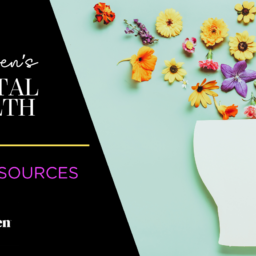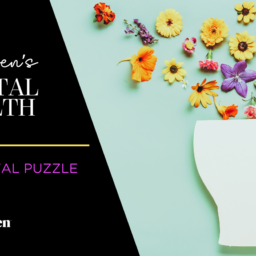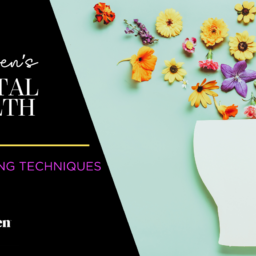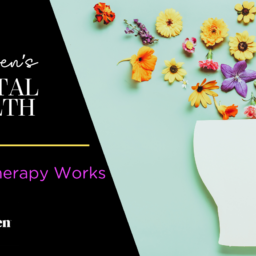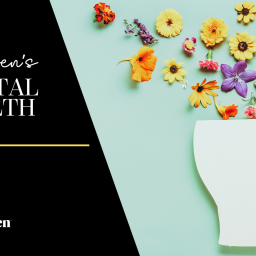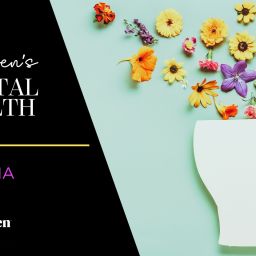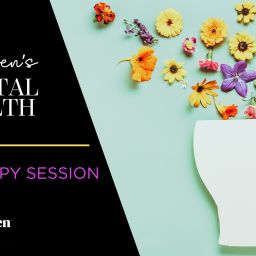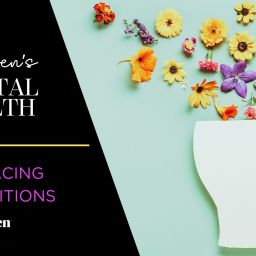
 Welcome to Indy Maven’s Mental Health column coming by way of Adair McDonald, LMHC (she/her/hers). Check out her website for information about how Adair works with clients, and to contact her directly to book a session.
Welcome to Indy Maven’s Mental Health column coming by way of Adair McDonald, LMHC (she/her/hers). Check out her website for information about how Adair works with clients, and to contact her directly to book a session.
Anyone who has felt depressed knows how hard it is to find the motivation to do all the things that are supposed to make a person feel better. Worse, they may not believe any of the things will truly help. This results in feeling stuck in a perpetual cycle of shame and guilt for not changing fast enough.
Depression is a commonly misunderstood condition, even within the field of mental health. To meet DSM criteria for Major Depressive Disorder, at least five of these symptoms must be present: loss of appetite or overeating, diminished interest in activities that were once pleasurable, lack of energy or extreme fatigue, sleeping too much or not enough, guilt or feelings of worthlessness, difficulty concentrating or making decisions, observable restlessness and/or observable sluggishness or slowed-down body movements, and/or thoughts of suicide or that it would be easier not to be alive.
Okay, let’s look at all that more closely. There are, in fact, several contradictions in there. Sleeping too much is a lot different than not sleeping enough. Feeling like you can’t stop pacing or fidgeting is a lot different than feeling as though you are glued to the couch. What are we to make of this? The fact is, it can be really difficult to get to the root of why someone is struggling with depression. It could be linked to biological reasons such as hormonal imbalance. It could be rooted in trauma. It could be associated with bipolar disorder. It could be grief. It could be fueled by the ups and downs of substance use. It is very, very commonly some mix of several of these. The good news about all of this is also the bad news: there are lots of things that could help a person feel better. But to a depressed person who is struggling to find hope and energy, it can feel incredibly overwhelming to be told to try a bunch of coping skills or treatments that may or may not be helpful and to feel like a human guinea pig in the meantime.
No matter the source of depression, the common factor is feeling bad about oneself, the world, or both. When one is already feeling down, it can feel hard to find a new doctor, start a new exercise routine, read a book about healthy habits, find a therapist…etc., etc., etc.—all the things you are “supposed” to do when you don’t feel good. People are pressured internally and externally to solve problems quickly, so when they can’t “fix” themselves due to the very symptoms of depression that make motivation so difficult, the guilt is piled on, and it becomes such a vicious cycle of self-blame, shame, and isolation.
At the end of the day, the most important thing you can do is have an alliance with yourself in agreeing that you aren’t choosing to be lazy or bad. If you are depressed, it really can feel like moving mountains to do the bare minimum to get through the day. So when you don’t make it to that yoga class or that trauma workbook is gathering dust on your nightstand, it is unlikely that more self-criticism and self-loathing are going to help you feel better. Instead, I encourage you to acknowledge how hard this is, and if you can, look for small steps that might help a little rather than an all-or-nothing approach to healing.
With that in mind, I’ve compiled a list of some of the most common struggles I encounter with my clients as well as the “this is way too much” advice that might be given and, instead, more approachable self-care steps that can help with minimal effort.
Isolation
 When one is depressed, it can feel like too much work to be with other people unless absolutely necessary. You could be afraid of being judged, not having anything interesting to say, or feeling that you will be anxious if you leave the comfort of home. Plus, the executive functioning required to make and keep plans could feel like way too much when weighed down by depression. It could feel like too much to go to a party where small talk is expected or to put on a happy face and go out to dinner with a friend. Instead, reach out to one person and do something low stakes: plan an easy walk together or ask them to send you funny memes throughout the week that you can respond to.
When one is depressed, it can feel like too much work to be with other people unless absolutely necessary. You could be afraid of being judged, not having anything interesting to say, or feeling that you will be anxious if you leave the comfort of home. Plus, the executive functioning required to make and keep plans could feel like way too much when weighed down by depression. It could feel like too much to go to a party where small talk is expected or to put on a happy face and go out to dinner with a friend. Instead, reach out to one person and do something low stakes: plan an easy walk together or ask them to send you funny memes throughout the week that you can respond to.
Numbing Out
Often, I have clients who are frustrated that they spend too much time on their phones despite knowing it isn’t great for them. Welcome to the club, right? Phones are addictive and deliver tiny bursts of dopamine. What depressed person wouldn’t have a hard time resisting that? But, of course, after hours of scrolling, people don’t generally feel refreshed or relaxed; they typically feel more drained than when they started. It could feel like too much to get up and do something “productive” instead of numbing out with the phone. Instead, put the phone out of reach and either read for pleasure or watch a quality movie. You might end up feeling inspired or comforted rather than drained.
Exhaustion
Fatigue is one of the most common symptoms associated with depression and burnout. Moving one’s body can really help boost energy, but a difficult exercise program often feels way out of reach when it is hard to even get off the couch. If it feels like too much to exercise hard, you risk pushing yourself to the point of pain or further exhaustion if your body hasn’t worked up to this. It takes time, as well as trial and error, to find a workout that truly makes you feel better. Instead, just get out of bed and sit on the floor. Maybe play some music or soothing sounds and stretch, allowing your body to move in whatever way feels good. If you notice any emotions coming up, just let them flow. Feelings need to be acknowledged in order to be released. If it is easier to do this as a guided exercise, you can find many free yin yoga audio tracks on apps such as Insight Timer. Yin yoga is generally very gentle, slow, and soothing and can be done wearing anything comfortable.
Self-Medicating
 This one is tricky because some absolutely need support around treating their eating disorder, getting sober, or stopping other harmful behaviors that are out of control. For some people, depression and other life problems can’t truly be addressed until this is managed. If you are one of these people and you know it or suspect it, reaching out to a specialist to treat the substance use or other addictive behavior is highly recommended. Still, self-medicating gets a bad rap. Of course, we are always looking for ways to feel better, and like anything, it helps to have self-compassion about that. But sometimes, we start to overutilize these soothing behaviors, which can have negative consequences and make us feel even worse about ourselves. Full abstinence from comfort eating, drinking, THC use, online shopping, gambling, or any number of preferred soothing behaviors may feel like too much too soon and may not even be necessary in the long run. Instead, pause often before and during the time you are indulging in these behaviors. Ask yourself, what need is longing to be filled? You might use the acronym HALT, which stands for Hungry, Angry, Lonely, or Tired. If you are any of these things and can fill the need in a truly nurturing way, do that, and then you may feel less inclined to self-medicate.
This one is tricky because some absolutely need support around treating their eating disorder, getting sober, or stopping other harmful behaviors that are out of control. For some people, depression and other life problems can’t truly be addressed until this is managed. If you are one of these people and you know it or suspect it, reaching out to a specialist to treat the substance use or other addictive behavior is highly recommended. Still, self-medicating gets a bad rap. Of course, we are always looking for ways to feel better, and like anything, it helps to have self-compassion about that. But sometimes, we start to overutilize these soothing behaviors, which can have negative consequences and make us feel even worse about ourselves. Full abstinence from comfort eating, drinking, THC use, online shopping, gambling, or any number of preferred soothing behaviors may feel like too much too soon and may not even be necessary in the long run. Instead, pause often before and during the time you are indulging in these behaviors. Ask yourself, what need is longing to be filled? You might use the acronym HALT, which stands for Hungry, Angry, Lonely, or Tired. If you are any of these things and can fill the need in a truly nurturing way, do that, and then you may feel less inclined to self-medicate.
Negative Self-Talk
Do you have a mean voice inside your head telling you all the ways you are failing? Does it tell you that none of this stuff will help anyway because you are far too broken to be helped? You are not alone. I’ve yet to meet a client that doesn’t have an inner critic. It IS too much to try to shut it down. Arguing with, ignoring, or attempting to overpower this voice with false bravado or insincere affirmations is unlikely to be helpful and might even create an inner battle that fuels the depression. Instead, turn towards the negative self-talk with compassion. Attempt to observe it as thoughts separate from your whole truth and get curious about what it thinks it’s doing for you. Accept that, for now, it is really easy to believe the things the inner critic is saying, but that there is hope for change as you learn more and more about the source of this voice.
These are just a few challenges and ideas that could help. Your challenges may be different, and the small, approachable steps might look different as well. Consider making your own list and see what comes up.
If you are feeling depressed, please know that you didn’t choose this, and you don’t have to go it alone. Take small steps in the direction of change and growth, and know that healing is, in general, not a linear path. Trial and error as to what actually helps is part of the process. Small steps throughout your days and weeks can add up and are worth taking the time to do. Even if it is hard to believe at times, small acts of self-care are reminders that there is hope and that you are, in fact, believing in your own ability to impact yourself positively. As you give yourself that message more and more, it will become true.
All of our content—including this article—is completely free. However, we’d love it if you would please consider supporting our journalism with an Indy Maven Membership.




